Essential Technologies Training Courses
Wray Castle Ltd offers a wide range of essential technologies training courses designed to equip professionals with the knowledge and skills needed to thrive in today's rapidly evolving telecommunications and technology landscape. Our courses cover a variety of essential technologies, including 5G, LTE, IP, radio engineering, network virtualization, and critical communications like TETRA and PMR.
Our essential technologies training courses are carefully crafted by industry experts with years of experience in the field. Whether you are new to the industry or looking to upskill, our courses provide a solid foundation in key technologies that are shaping the future of telecommunications.
At Wray Castle, we understand the importance of staying ahead of the curve in a competitive market. That's why our essential technologies training courses are constantly updated to reflect the latest industry trends and developments. With our courses, you can be sure that you are learning the most up-to-date and relevant information.
Our essential technologies training courses are delivered through our innovative Wray Castle Hub platform, which offers a seamless learning experience for professionals across operators, vendors, regulators, and government institutions. With over 500 hours of content, live and self-paced courses, virtual labs, webinars, and more, our platform provides a comprehensive learning solution that caters to the diverse needs of our learners.
Upon completion of our essential technologies training courses, learners will receive digital badges to showcase their achievements and enhance their professional profiles. With tutor support, glossaries, and other resources available, our courses ensure that learners have the support they need to succeed.
Choose Wray Castle for your essential technologies training needs and stay ahead of the curve in the fast-paced world of telecommunications and technology. Join us today and take your career to the next level.
Essential Technologies Training Courses
-
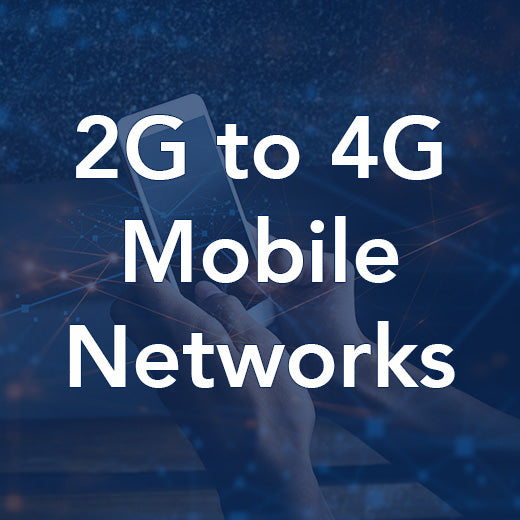
2G to 4G Mobile Networks
Course Code: MB1404 Course Overview This 2G to 4G Mobile Networks training course offered by Wray Castle provides a comprehensive technical overview of key cellular technologies, including 2G GSM, GPRS, 3G UMTS, and 4G LTE, all in one convenient package. Designed for technical professionals who need a solid understanding of these technologies without the need to delve into each one separately, this course is ideal for engineers, technical sales representatives, technical managers, and other staff members looking to gain a broad understanding of modern mobile technologies.Participants in this course do not need any specific prerequisites other than the ability to grasp technical information, making it accessible to a wide range of individuals interested in expanding their knowledge of mobile networks. The curriculum covers essential topics such as PSTN overview, SS7 signaling basics, call control signaling, GSM CS domain interfaces and protocols, UMTS architecture, LTE, and more. By the end of the training, attendees will have a solid foundation in 2G to 4G mobile networks, enabling them to better navigate the complexities of modern cellular technologies in their professional roles. Who Would Benefit This course is suitable for engineering, technical sales, technical management and other staff who require a general technical overview of modern mobile technologies but who do not need to invest the time necessary to learn about each technology in depth. Prerequisites This is a technical foundation course. Candidates do not need any specific prerequisites other than the ability to grasp technical information. Course Contents PSTN Overview SS7 Signalling Basics Call Control Signalling, ISUP and SCCP 2G Circuit Switched Domain GSM CS Domain Interfaces and Protocols CAMEL GPRS UMTS Architecture Overview UMTS Air Interface UMTS Circuit Switched Core – Protocols and Procedures UMTS Packet Switched Core – Protocols and Procedures LTE
POA: Private Course
-
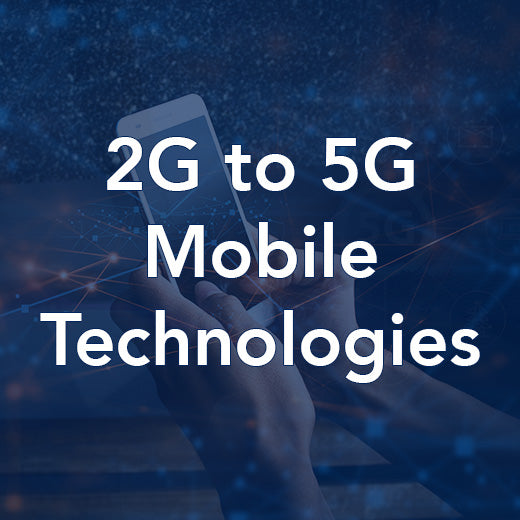
2G to 5G Mobile Technologies
Our 2G to 5G Mobile Technologies Training Course is designed to provide professionals in the telecommunications industry with the knowledge and skills needed to understand and work with the latest mobile technologies. With the rapid evolution of mobile networks, staying up-to-date with the latest advancements is crucial for professionals looking to advance their careers in this field. Our comprehensive course covers everything from the basics of 2G technology to the cutting-edge developments in 5G networks.By enrolling in our training course, participants will gain a deep understanding of the principles and technologies behind 2G, 3G, 4G, and 5G networks. They will learn about the key features and capabilities of each generation, as well as the challenges and opportunities presented by the transition to 5G. Our expert instructors will guide participants through hands-on exercises and real-world case studies to ensure they have the practical skills needed to succeed in this dynamic industry.Whether you are a seasoned professional looking to upgrade your skills or a newcomer to the telecommunications field, our 2G to 5G Mobile Technologies Training Course will provide you with the knowledge and expertise needed to excel in this fast-paced industry. Stay ahead of the curve and advance your career with our industry-leading training program. Prerequisites A basic understanding of telecoms principles would be beneficial. Topic Areas Include: An overview of basic radio and cellular techniques and technologies Network Generations from 2G to 5G 3GPP Release programme An overview of 2G (GSM) network architecture and functionality GSM TDMA air interface operating principles GPRS and EDGE upgrades to GSM GSM services TETRA networks An overview of 3G (UMTS) network architecture and functionality UMTS WCDMA air interface operating principles HSPA and HSPA+ upgrades to UMTS An overview of 4G (LTE) network architecture and functionality LTE OFDMA air interface operating principles Evolved Packet Core (EPC) operation Small cells and heterogeneous networks Self Organising Networks (SON) LTE voice options LTE Advanced and LTE Advanced Pro Wi-Fi/Cellular interworking LTE operation in unlicensed frequency bands Machine Type Communications (MTC) LTE for public safety Introduction to 5G 3GPP use cases for 5G Performance targets for 5G Radio Spectrum for 5G 5G OFDMA air interface 5G System Architecture Non Standalone (NSA) and Standalone (SA) New Radio (NR) 5G Core Network Functions Trainer: Les Granfield Les is a technical trainer with 35 years of experience. His expertise extends across a wide range of telecommunications technologies. He specializes in GSM, GSM-R, ERTMS/ETCS, UMTS and LTE radio access networks, radio planning, radio access network optimization and Push to Talk over Cellular (PoC).
£1,815.00
-
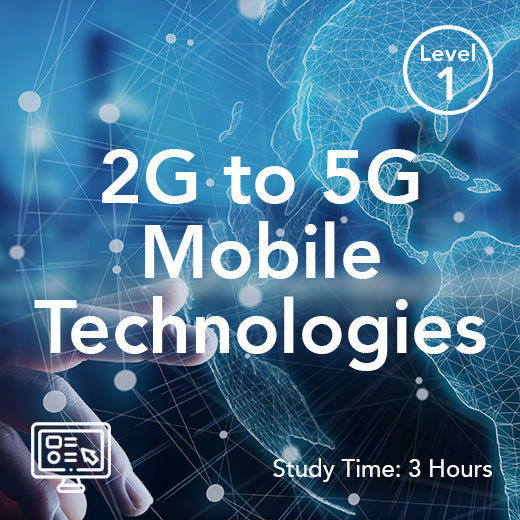
2G to 5G Mobile Technologies (On-Demand)
Our 2G to 5G Mobile Technologies Training Course is designed to provide professionals in the telecommunications industry with the knowledge and skills needed to understand and work with the latest mobile technologies. With the rapid evolution of mobile networks, staying up-to-date with the latest advancements is crucial for professionals looking to advance their careers in this field. Our comprehensive course covers everything from the basics of 2G technology to the cutting-edge developments in 5G networks.By enrolling in our training course, participants will gain a deep understanding of the principles and technologies behind 2G, 3G, 4G, and 5G networks. They will learn about the key features and capabilities of each generation, as well as the challenges and opportunities presented by the transition to 5G. Our expert instructors will guide participants through hands-on exercises and real-world case studies to ensure they have the practical skills needed to succeed in this dynamic industry.Whether you are a seasoned professional looking to upgrade your skills or a newcomer to the telecommunications field, our 2G to 5G Mobile Technologies Training Course will provide you with the knowledge and expertise needed to excel in this fast-paced industry. Stay ahead of the curve and advance your career with our industry-leading training program. This self-paced on-demand distance learning course features illustrated course books, videos, tests and full tutor support. Who would benefit This course is suitable for engineering, technical sales, technical management and other staff who require a general technical overview of mobile technologies but who do not need to invest the time necessary to learn about each technology in depth. Prerequisites A basic understanding of telecoms principles would be beneficial. Topic Areas Include: An overview of basic radio and cellular techniques and technologies Network Generations from 2G to 5G 3GPP Release programme An overview of 2G (GSM) network architecture and functionality GSM TDMA air interface operating principles GPRS and EDGE upgrades to GSM GSM services TETRA networks An overview of 3G (UMTS) network architecture and functionality UMTS WCDMA air interface operating principles HSPA and HSPA+ upgrades to UMTS An overview of 4G (LTE) network architecture and functionality LTE OFDMA air interface operating principles Evolved Packet Core (EPC) operation Small cells and heterogeneous networks Self Organising Networks (SON) LTE voice options LTE Advanced and LTE Advanced Pro Wi-Fi/Cellular interworking LTE operation in unlicensed frequency bands Machine Type Communications (MTC) LTE for public safety Introduction to 5G 3GPP use cases for 5G Performance targets for 5G Radio Spectrum for 5G 5G OFDMA air interface 5G System Architecture Non Standalone (NSA) and Standalone (SA) New Radio (NR) 5G Core Network Functions
£750.00
-

Cellular Backhaul Technologies (On-Demand)
Backhaul is the backbone of mobile networks, connecting cell sites to the core and ensuring seamless service delivery. As networks evolve to support 4G, 5G, and beyond, understanding backhaul technologies and planning principles is critical for telecom professionals. In this course, you’ll start with an overview of backhaul planning, including traditional and evolved requirements, architecture for multi-RAT environments, and techniques for dimensioning transport networks. You’ll learn how backhaul supports access networks and why its design impacts performance and scalability. Next, you’ll explore transport network architecture, covering 3GPP definitions, layered design, and evolution toward multi-operator and multi-RAT solutions. The course examines backhaul transmission options, comparing Layer 1 technologies, Ethernet physical layers, and microwave radio systems, along with their capacities and limitations. You’ll also dive into synchronization for mobile backhaul, including frequency, phase, and time requirements. Topics include Precision Time Protocol (PTP), Synchronous Ethernet, telecom profiles, and synchronization architectures for packet-based networks. Finally, you’ll review industry initiatives and standards, such as NGMN and MEF, and learn how IP/MPLS, VLAN management, and QoS mapping enable secure, resilient backhaul. The course addresses security, load balancing, and operational best practices for modern mobile networks. Designed for professionals in telecoms and network engineering, this course provides a clear, practical introduction to cellular backhaul technologies - ideal for anyone seeking to understand how transport networks evolve to meet the demands of next-generation mobile services. Course Contents Backhaul Planning Overview Transport Network Backhaul Technologies Synchronisation of Mobile Backhaul Backhaul Initiatives
£95.00
-

Cellular Communication - Idle and Connected Mode Activities (On-Demand)
Mobile devices constantly switch between idle and connected states to balanceperformance and power efficiency. Understanding these activities is essential for anyoneworking in mobile networks, radio planning, or device optimization. In this course, you’ll start with idle mode activities, exploring how devices select andreselect cells across technologies like GSM, UMTS, LTE, 5G, and Wi-Fi. You’ll learn aboutpower-on procedures, cell selection criteria, location updating, and how routing and trackingareas are managed. The course explains key parameters such as C1 and C2, andintroduces advanced concepts like URA updates and PLMN selection. Next, you’ll dive into connected mode activities, covering measurement procedures andhandover strategies for GSM, UMTS, LTE, and 5G. You’ll explore how devices report signalquality, trigger events for handover, and maintain connectivity during mobility. Topicsinclude soft handover, outer loop power control, and advanced measurement events (A1–A6, B1–B2) used in 5G networks. You’ll also learn about automatic neighbour relations andhow they simplify network management. Designed for professionals in telecoms and wireless engineering, this course provides aclear, practical introduction to idle and connected mode operations - ideal for anyoneseeking to understand how mobile devices interact with cellular networks in real-worldscenarios. Course Contents Idle Mode Activity for Mobile Devices GSM Cell Selection GSM Cell Reselection Location Updating UMTS Cell Selection and Reselection UMTS Update Procedures LTE Power On Procedure LTE Cell Reselection 5G Cell Selection Procedure 5G Cell Reselection Wi-Fi Mobility Connected Mode Activity for Mobile Devices GSM Handovers UMTS Handovers LTE Handovers 5G Handovers
£95.00
-
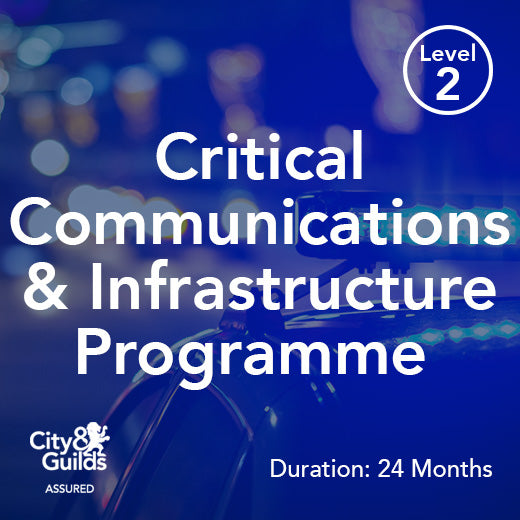
Critical Communications & Infrastructure Programme (Emergency Services Track)
The Critical Communications and Infrastructure Programme (Emergency Services Track) is a comprehensive programme designed to equip professionals in the Emergency Services with the essential knowledge and skills to excel in their roles. The programme aims to provide participants with a holistic understanding of critical communication technologies, strategic insights, and practical skills to navigate the complexities of the ecosystem. This programme has been assured by City & Guilds. Assured status provides validation and recognition for the learner. It is a symbol of learning excellence and quality and is a reassurance that the training undertaken meets best practice standards. Critical Communications & Infrastructure Programme (Emergency Services Track) Syllabus Foundation Courses Technology Fundamentals Course Modules: Defining Telecoms Background to the Telecom Network Digital Fixed Telecom Networks Data Networks Mobile Networks and Wi-Fi Broadband and Emerging Networks 2G to 5G Mobile Technologies Course Modules: Principles of Mobile Cellular Networks 2nd Generation Mobile Networks 3rd Generation Mobile Networks 4th Generation Mobile Networks 5th Generation Mobile Networks Radio Principles Course Modules: A Need for Radio Frequency and Bandwidth Modulation Radio Spectrum Antennas and Transmission Lines Propagation Radio Coverage Radio Interference Analogue and Digital Systems Specialist Courses LTE Mission Critical Communications Course Modules: Requirements of a Mission Critical Network The LTE Radio Interface Multimedia Broadcast Multicast Service The IP Multimedia Subsystem (IMS) Group Communication System Enablers Mission Critical Push to Talk Mission Critical Video Mission Critical Data LTE and LMR Interworking LTE Engineering Course Modules: Introduction to LTE OFDMA Physical Layer Access Stratum Protocols LTE UEs and Access Networks LTE Core Networks LTE Operation LTE Release 9 and Beyond 5G Engineering Course Modules: Introduction to 5G Principles of the 5G New Radio 5G Air Interface 5G Network Architecture 5G Procedures Releases 16 and 17 About City & Guilds City & Guilds is a household brand and a global leader in skills development. Over one million people earn a City & Guilds qualification every year, providing them with the skills they need to thrive in the workplace.In the global economy, the ability to compete depends on building a skilled, competent and confident workforce. City & Guilds understands the value of portable skills and globally recognised standards that enable people and organisations to succeed. It partners with Governments, employers and educators in over 50 countries, across five continents, to advise them on developing high-quality skills training that meets the needs of the global workforce, without compromising on local demands. Enrolment Fees: £2,995 (+VAT) Programme Duration: 24 months (Programme is On-Demand, learners can start at any time) Bespoke In-Company Schemes The Critical Communications and Infrastructure Programme provide the ideal structure for formalising training programmes for teams across your business. Contact us on info@wraycastle.com for more information.
£2,995.00
-
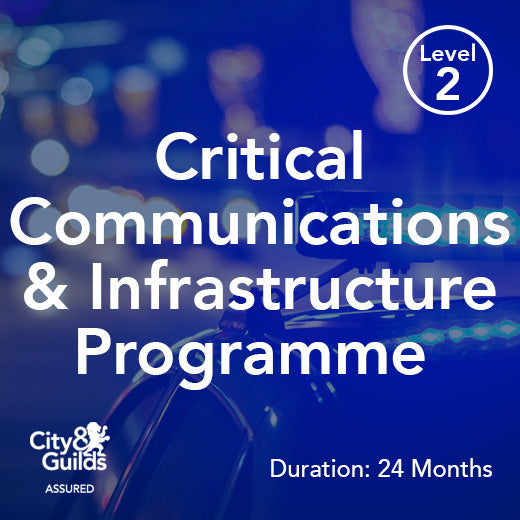
Critical Communications & Infrastructure Programme (Police Track)
Next Cohort: 27th March 2026 Build essential telecoms knowledge and skills to aid forensic investigations and provide expert witness testimony. The widespread use of mobile telephones has proven to be a useful source of information for law enforcement agencies. The ability to prove or disprove that a mobile device was used in the area of, or location of, a point of interest is invaluable. But to safely prove the case requires an understanding of cellular mobile technologies. The Critical Communications & Infrastructure Programme (Police Track) provides those working in Law Enforcement with a detailed understanding of the mobile network technologies of today and tomorrow, allowing them to conduct efficient investigations and provide compelling expert witness evidence in court. We have combined some of our most popular training courses to build a guided learning pathway that enables you to demonstrate your expertise and competence in modern telecom technologies. Who would benefit? Our Critical Communications & Infrastructure Programme (Police Track) has been designed for anyone working Law Enforcement from new starters looking to build their technical knowledge from the ground up to more experienced engineers looking to formalise and expand their knowledge base. Rigorous testing, regular digital badging and certification ensures that successful students are able to demonstrate the breadth and depth of their knowledge. This programme has been assured by City & Guilds. Assured status provides validation and recognition for the learner. It is a symbol of learning excellence and quality and is a reassurance that the training undertaken meets best practice standards. Critical Communications & Infrastructure Programme (Police Track) Syllabus Foundation Courses Technology Fundamentals Course Modules: Defining Telecoms Background to the Telecom Network Digital Fixed Telecom Networks Data Networks Mobile Networks and Wi-Fi Broadband and Emerging Networks 2G to 5G Mobile Technologies Course Modules: Principles of Mobile Cellular Networks 2nd Generation Mobile Networks 3rd Generation Mobile Networks 4th Generation Mobile Networks 5th Generation Mobile Networks Radio Principles Course Modules: A Need for Radio Frequency and Bandwidth Modulation Radio Spectrum Antennas and Transmission Lines Propagation Radio Coverage Radio Interference Analogue and Digital Systems Specialist Courses The TETRA System - An Overview Course Modules: Introduction to TETRA TETRA Services TETRA Network Components TETRA Network Architecture Air Interface Radio Procedures TETRA System Capacity Direct Mode Operation (DMO) Security Aspects of TETRA Radio Network Surveys Course Modules: Cellular Radio Principles GSM/UMTS/LTE/5G Networks Wi-Fi Radio Networks Radio Measurements Idle Mode Activity for Mobile Devices Connected Mode Activities for Mobile Devices Tools for Radio Surveys Guidance for Radio Network Surveys WiFi Engineering Overview Course Modules: Wireless LAN Technologies and Standards 802.11 PHY MAC Frame Structures MAC Procedures Security Wi-Fi Troubleshooting About City & Guilds Assured City & Guilds is a household brand and a global leader in skills development. Over one million people earn a City & Guilds qualification every year, providing them with the skills they need to thrive in the workplace.In the global economy, the ability to compete depends on building a skilled, competent and confident workforce. City & Guilds understands the value of portable skills and globally recognised standards that enable people and organisations to succeed. It partners with Governments, employers and educators in over 50 countries, across five continents, to advise them on developing high-quality skills training that meets the needs of the global workforce, without compromising on local demands. Enrolment Fees: £2,995 (+VAT) Programme Duration: 24 months (Programme is On-Demand, learners can start at any time) Bespoke In-Company Schemes The Critical Communications and Infrastructure Programme provide the ideal structure for formalising training programmes for teams across your business. Contact us on info@wraycastle.com for more information.
£2,995.00
-
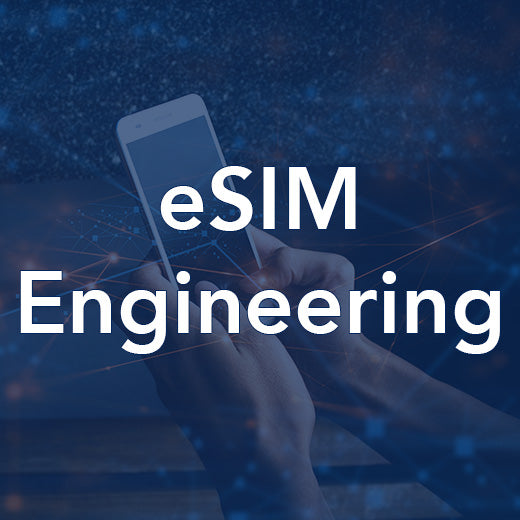
eSIM Engineering
The eSIM Engineering Training Course offered by Wray Castle provides a comprehensive technical overview of eSIM technology and the latest remote SIM provisioning specifications from GSMA. This course delves into the transition of the SIM from physical to digital realms, exploring unique system architectures for both M2M and Consumer applications. Participants will gain insights into the evolution of eSIM technology and a glimpse into the future developments in this field. Engineers, product managers, and other professionals seeking to implement eSIM-based products and services within their organizations will greatly benefit from this course. A general engineering background with some knowledge of GSM SIM technology is assumed, and a basic understanding of mobile networks would be advantageous. The course covers essential topics such as the introduction to eSIM, GSMA Consumer eSIM Specification, GSMA M2M eSIM Specification, enhancements in the Consumer eSIM Specification, and the future prospects of eSIM technology. Who would benefit The course is intended for engineers, product managers and other staff who are looking to prepare for or actively roll out eSIM-based products and services within their organisations. Prerequisites A general engineering background with some knowledge of GSM SIM technology is assumed. A basic understanding of mobile networks would be desirable. Topic areas include Introduction to eSIM GSMA Consumer eSIM Specification GSMA M2M eSIM Specification GSMA Consumer eSIM Specification Enhancements The Future of eSIM
POA: Private Course
-
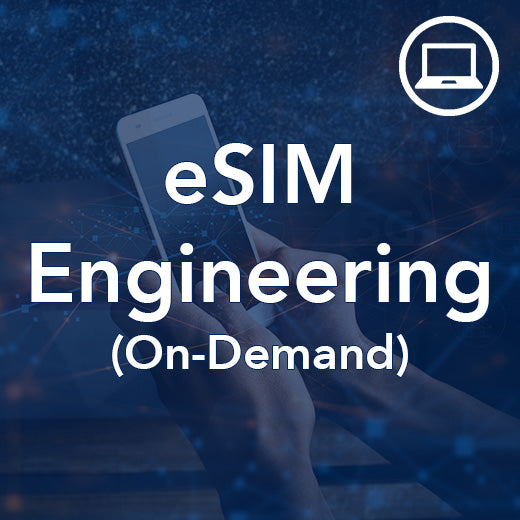
eSIM Engineering (On-Demand)
The eSIM Engineering Training Course offered by Wray Castle provides a comprehensive technical overview of eSIM technology and the latest remote SIM provisioning specifications from GSMA. This course delves into the transition of the SIM from physical to digital realms, exploring unique system architectures for both M2M and Consumer applications. Participants will gain insights into the evolution of eSIM technology and a glimpse into the future developments in this field. Engineers, product managers, and other professionals seeking to implement eSIM-based products and services within their organizations will greatly benefit from this course. A general engineering background with some knowledge of GSM SIM technology is assumed, and a basic understanding of mobile networks would be advantageous. The course covers essential topics such as the introduction to eSIM, GSMA Consumer eSIM Specification, GSMA M2M eSIM Specification, enhancements in the Consumer eSIM Specification, and the future prospects of eSIM technology. This self-paced on-demand distance learning course features illustrated course books, videos, tests and full tutor support. Who would benefit The course is intended for engineers, product managers and other staff who are looking to prepare for or actively roll out eSIM-based products and services within their organisations. Prerequisites A general engineering background with some knowledge of GSM SIM technology is assumed. A basic understanding of mobile networks would be desirable. Topic Areas Include Introduction to eSIM GSMA Consumer eSIM Specification GSMA M2M eSIM Specification GSMA Consumer eSIM Specification Enhancements The Future of eSIM
£1,815.00
-
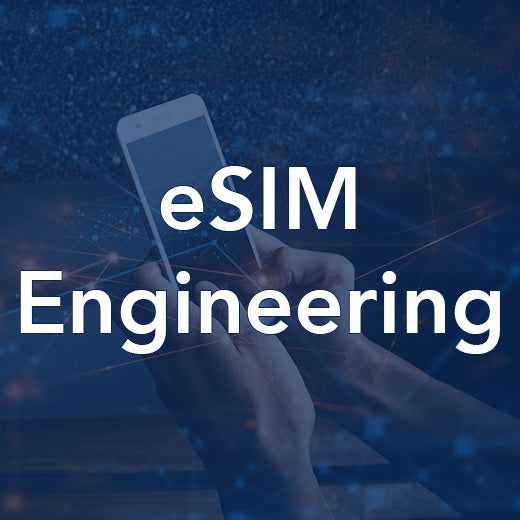
eSIM Engineering Overview
Our eSIM Engineering Overview Training Course provides a comprehensive technical overview of eSIM technology and the latest remote SIM provisioning specifications from GSMA. This course delves into the role of the SIM, the transition from physical to digital, system architectures for both M2M and Consumer applications, the evolution of eSIM, and a glimpse into the future of this technology. Engineers, product managers, and other professionals seeking to implement eSIM-based products and services will benefit greatly from this course. Participants are expected to have a general engineering background with some knowledge of GSM SIM technology. While not mandatory, a basic understanding of mobile networks would be advantageous. The course covers essential topics such as Introduction to eSIM, GSMA Consumer eSIM Specification, GSMA M2M eSIM Specification, GSMA Consumer eSIM Specification Enhancements, and The Future of eSIM. Who would benefit The course is intended for engineers, product managers and other staff who are looking to prepare for or actively roll out eSIM-based products and services within their organisations. Prerequisites A general engineering background with some knowledge of GSM SIM technology is assumed. A basic understanding of mobile networks would be desirable. Topic Areas Include Introduction to eSIM GSMA Consumer eSIM Specification GSMA M2M eSIM Specification GSMA Consumer eSIM Specification Enhancements The Future of eSIM
POA: Private Course
-
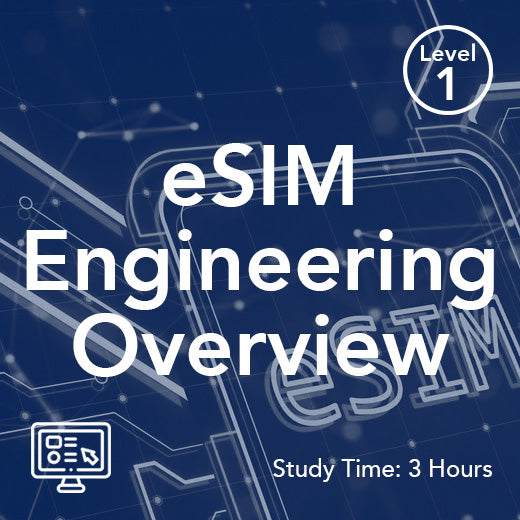
eSIM Engineering Overview (On-Demand)
Our eSIM Engineering Overview Training Course provides a comprehensive technical overview of eSIM technology and the latest remote SIM provisioning specifications from GSMA. This course delves into the role of the SIM, the transition from physical to digital, system architectures for both M2M and Consumer applications, the evolution of eSIM, and a glimpse into the future of this technology. Engineers, product managers, and other professionals seeking to implement eSIM-based products and services will benefit greatly from this course. Participants are expected to have a general engineering background with some knowledge of GSM SIM technology. While not mandatory, a basic understanding of mobile networks would be advantageous. The course covers essential topics such as Introduction to eSIM, GSMA Consumer eSIM Specification, GSMA M2M eSIM Specification, GSMA Consumer eSIM Specification Enhancements, and The Future of eSIM. This self-paced on-demand distance learning course features illustrated course books, videos, tests and full tutor support. Who would benefit The course is intended for engineers, product managers and other staff who are looking to prepare for or actively roll out eSIM-based products and services within their organisations. Prerequisites A general engineering background with some knowledge of GSM SIM technology is assumed. A basic understanding of mobile networks would be desirable. Topic Areas Include Introduction to eSIM GSMA Consumer eSIM Specification GSMA M2M eSIM Specification GSMA Consumer eSIM Specification Enhancements The Future of eSIM
£95.00
-
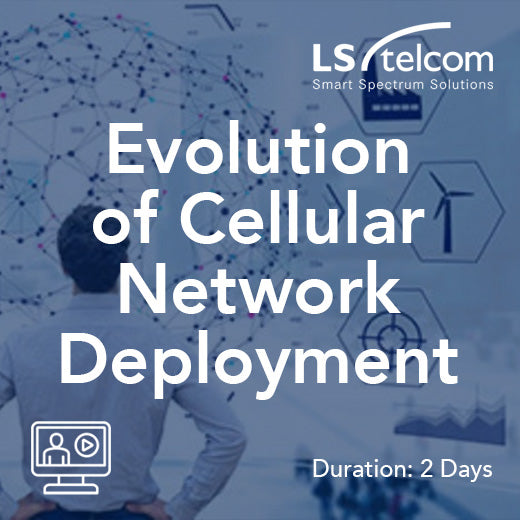
Evolution of Cellular Network Deployment (LS telcom)
5G is now widely deployed across the world initially using the non-standalone configuration, meaning the traffic is being carried over the 5G radio network, but it is passed on to a 4G evolved packet core network. Operators are migrating to a standalone configuration and this evolution will have an impact on the range of features that can be offered to users. One of the main features of 5G is enhanced mobile broadband, but in standalone mode enhancements will instantly become available such as industrial automation, network slicing and much lower latency. This course not only examines the regulatory, operational and commercial challenges of 5G networks migrating from non-standalone to standalone, but also provides a detailed view of how operators have deployed 5G within the range of different spectrum bands and configurations. It explores how improvements can be made as network technologies evolve. It provides examples and exercises which untangle these challenges of 5G network deployment for all the parties involved, and it will enable informed business decisions, and help those involved in 5G to continually benefit from future use and roll-out strategies. Course Objectives After completing the course, participants will have a solid grounding in the challenges facing 5G network roll-out and deployment across a range of different scenarios, and will understand the challenges and benefits compared to historical wireless technologies. Intended for Those who wish to strengthen their knowledge of 5G technology, or will be involved in deployment, roll-out or use, and who need to understand the challenges and implications of 5G roll-out on their businesses or organizations. This includes governments, local authorities, vertical industries (e.g. energy, transport, education,healthcare, manufacturing or utilities), operators and vendors. Contents Understand the complexities of 5G roll out and the roadmap over longer-term deployment Identify the key challenges in deploying 5G infrastructure and evolutions towards new features in Standalone mode Examine the likely upgrade costs moving from Non-Standalone to About LS telcom: LS telcom is a global leader in technologies and consulting services for efficient radio spectrum use, optimizing spectrum management to ensure reliable, interference-free, and secure radio services. Our portfolio includes consulting, measurement services, and integrated solutions for planning, analysis, monitoring, and managing radio infrastructure. Serving customers in over 100 countries, including regulatory authorities, network operators, and industries such as transport, utilities, and security, LS telcom operates globally with subsidiaries and offices in locations like Germany, the UK, Canada, India, and the UAE. Headquartered in Lichtenau, Germany, LS telcom AG has been listed on the German Stock Exchange since 2001 (ISIN DE 0005754402).
£690.00
-
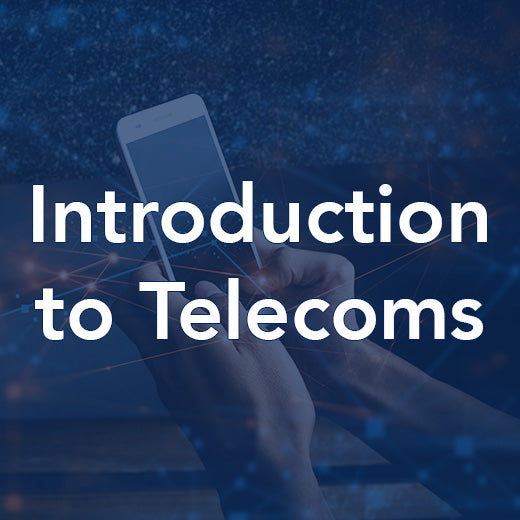
Introduction to Telecoms
The Introduction to Telecoms Training Course is designed to provide participants with a comprehensive understanding of the core technologies used in fixed, mobile, and IP-based telecoms networks. Over the course of 3 days, attendees will delve into the fundamentals of networking technologies, including switching, transmission, and signalling, as well as the services that they support. The training also covers next-generation networking in an all-IP environment, ensuring that participants are equipped with the knowledge needed to excel in the telecommunications industry. Ideal for those currently working in or looking to enter the telecommunications field, this course is perfect for individuals who need a solid grasp of the functions and services offered by modern networks. Participants should have a basic mathematical ability and a technical aptitude, with the intention to pursue a technical role in the industry. By exploring topics such as telecoms evolution, network components and services, and mobile cellular systems, attendees will gain valuable insights into the ever-evolving world of telecommunications. Who would benefit Those working in or entering the telecommunications industry who need to understand the functions and services provided by modern networks. Prerequisites Mathematical ability and aptitude for technical subjects, with the intention to progress in a technical role. Topic Areas Include Telecoms evolution Network components and services The PSTN and ISDN: access and core networks Basic analogue and digital information concepts Time division multiplexing and switching techniques Transmission systems: PDH, SDH, WDM and OTN Mobile cellular systems: 2G, 2.5G, 3G, 4G/LTE and 5G Packet-switched techniques IP, Ethernet, the Internet, ISPs and Internet Services Fixed and Mobile Broadband access technologies Next Generation fixed and mobile networks IP Multimedia Subsystem
£2,660.00
-
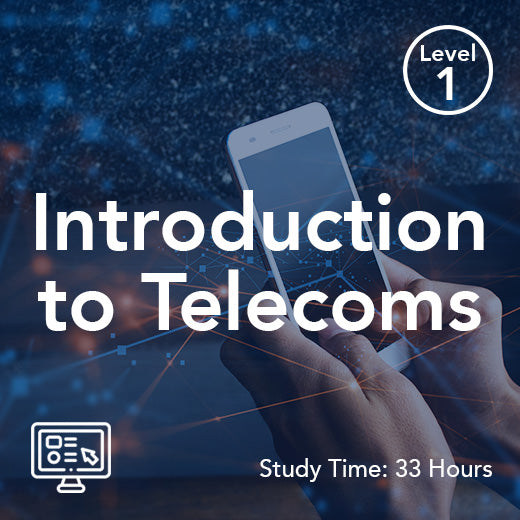
Introduction to Telecoms (On-Demand)
The Introduction to Telecoms Training Course is designed to provide participants with a comprehensive understanding of the core technologies used in fixed, mobile, and IP-based telecoms networks. Learners will delve into the fundamentals of networking technologies, including switching, transmission, and signalling, as well as the services that they support. The training also covers next-generation networking in an all-IP environment, ensuring that participants are equipped with the knowledge needed to excel in the telecommunications industry. Ideal for those currently working in or looking to enter the telecommunications field, this course is perfect for individuals who need a solid grasp of the functions and services offered by modern networks. Participants should have a basic mathematical ability and a technical aptitude, with the intention to pursue a technical role in the industry. By exploring topics such as telecoms evolution, network components and services, and mobile cellular systems, attendees will gain valuable insights into the ever-evolving world of telecommunications. This self-paced on-demand distance learning course features illustrated course books, videos, tests and full tutor support. Who would benefit Those working in or entering the telecommunications industry who need to understand the functions and services provided by modern networks. Prerequisites Mathematical ability and aptitude for technical subjects, with the intention to progress in a technical role. Topic Areas Include Telecoms evolution Network components and services The PSTN and ISDN: access and core networks Basic analogue and digital information concepts Time division multiplexing and switching techniques Transmission systems: PDH, SDH, WDM and OTN Mobile cellular systems: 2G, 2.5G, 3G and 3.5G Packet-switched techniques IP, Ethernet, the Internet, ISPs and Internet Services Fixed and Mobile Broadband access technologies Next Generation fixed and mobile networks IP Multimedia Subsystem Also available as a Live Online Training Programme, learn more.
£2,660.00
-
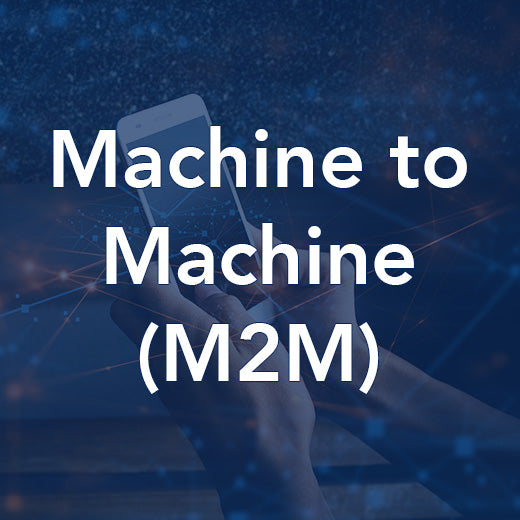
Machine to Machine (M2M)
This course covers the following topics: Overview of M2M; Architecture of M2M; M2M Applications; M2M Networks and Communication Technologies; M2M Ecosystem; M2M Market and Business Dynamics; M2M Security; M2M Standardization and Regulatory Issues; M2M Challenges and Issues and M2M Applications and Case Studies. Machine Type Communications for LTE is a crucial training course designed to provide participants with a comprehensive understanding of LTE technologies for the Internet of Things (IoT). Participants will be introduced to LTE and the Internet of Things, gaining insights into the latest advancements and applications in machine type communications. The course covers essential topics such as LTE technologies for the IoT, equipping attendees with the necessary expertise to navigate the complexities of this cutting-edge technology. By enrolling in this training course, participants can stay ahead of the curve and gain a competitive edge in the dynamic world of LTE and machine type communications. Whether you are a seasoned professional or new to the field, this course offers valuable insights and practical knowledge to help you succeed in your career. Who would benefit This course is designed for telecoms professionals who are involved in the planning, design, implementation, operations and management of M2M networks. This course is built in accordance with ETSI/3GPP, OMA and the Internet of Things Architecture (IOT- A) and so is primarily aimed at cellular implementations of M2M. Prerequisites This course comprehensively covers the main topic areas of M2M and as such there are no real prerequisites although a good understanding of telecoms networks and IP routing would be beneficial. Topic Areas Include Introduction to M2M M2M Applications M2M Standardization M2M Protocols and Networking Technologies M2M Security Cellular M2M M2M Challenges and Issues M2M Ecosystem and Market
POA: Private Course
-
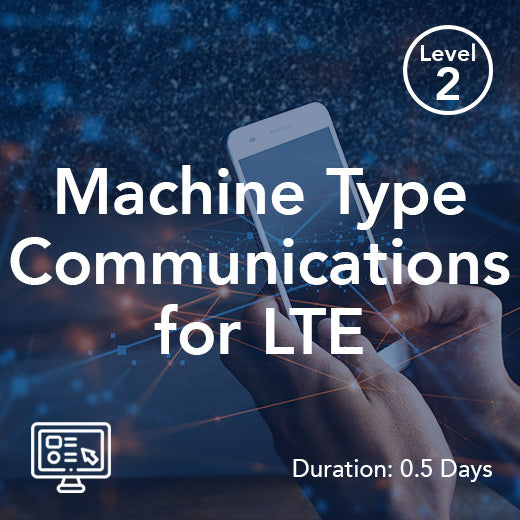
Machine Type Communications for LTE
Machine Type Communications for LTE is a crucial training course designed to provide participants with a comprehensive understanding of LTE technologies for the Internet of Things (IoT). Participants will be introduced to LTE and the Internet of Things, gaining insights into the latest advancements and applications in machine type communications. The course covers essential topics such as LTE technologies for the IoT, equipping attendees with the necessary expertise to navigate the complexities of this cutting-edge technology. By enrolling in this training course, participants can stay ahead of the curve and gain a competitive edge in the dynamic world of LTE and machine type communications. Whether you are a seasoned professional or new to the field, this course offers valuable insights and practical knowledge to help you succeed in your career. Course Contents Introduction to LTE and the Internet of Things (IoT) LTE Technologies for the IoT
POA: Private Course
-
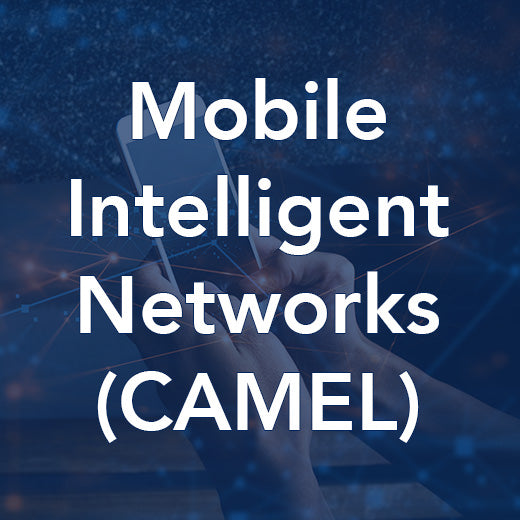
Mobile Intelligent Networks (CAMEL)
Our Mobile Intelligent Networks CAMEL Training Course (Course Code: MB90) is designed to provide an in-depth understanding of Intelligent Network (IN) concepts, specifically focusing on IN Capability Set 1 (IN-CS1) and its interworking with CAMEL and mobile networks. This course covers a range of topics including Basic Call State Models (BCSM), Detection Points (DP) types and arming, CAMEL Phases 1, 2, and 3 features, operation and procedures, as well as CAMEL interaction with both circuit-switched (CS) and packet-switched (PS) mobile networks. Ideal for individuals looking to implement value-added services within mobile networks using CAMEL technology, this course requires participants to have a good understanding of technical language and concepts, as well as a solid knowledge of GSM operation. Familiarity with SS7 is also beneficial for a comprehensive learning experience. Expand your expertise in Intelligent Network concepts and CAMEL technology with our comprehensive training course. Gain insights into CAMEL Information Flows, charging functions, pre-paid solutions, real-time charging, and analysis of CAMEL signalling. Whether you are a telecom professional looking to advance your career or a company seeking to implement innovative services in mobile networks, this course will equip you with the necessary skills and knowledge to succeed in the dynamic world of mobile intelligent networks. Who would benefit Those needing to know how value-added services can be implemented within mobile networks using CAMEL technology. Prerequisites An ability to understand technical language and concepts, and a good knowledge of GSM operation. Knowledge of SS7 is also beneficial. Topic Areas Include Intelligent Network Concepts Intelligent Network – Capability Set 1 Basic Call State Models (BCSM) Detection Points (DP) types and arming CAMEL Phases 1, 2 and 3 features, operation and procedures BCSMs, DPs and CAMEL Subscription Information CAMEL Information Flows CAMEL Interaction with CS and PS mobile networks CAMEL Interaction with CS and PS mobile networks Charging functions Pre-paid solutions and real-time charging Analysis of CAMEL signalling
POA: Private Course
-
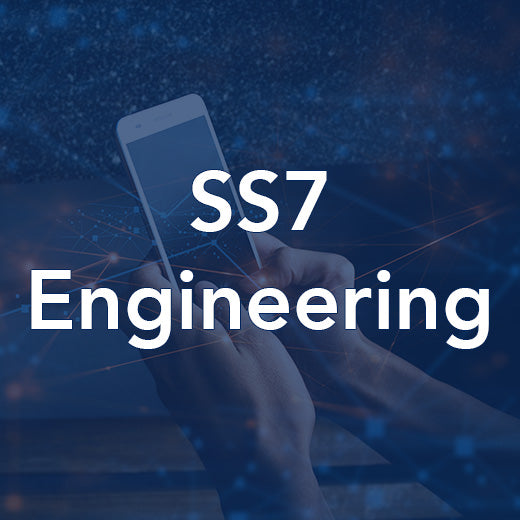
SS7 Engineering
Course Code: QS2500 Course Summary SS7 is a key element in the control plane of fixed and mobile networks and in Intelligent Network scenarios. It facilitates communication between SS7 hosted ‘applications’ enabling end-to-end service delivery. This course provides a comprehensive description of SS7 protocols, functions and procedures. Who would benefit Those who need a detailed understanding of the implementation and functions of SS7. Prerequisites An understanding of the PSTN architecture and circuit- and packet-switched concepts, together with a working knowledge of the OSI Model and primary rate (E1/T1) bearers. Topic Areas Include Overview of signalling and signalling system SS7 architecture: SP, STPs, Links, Link Sets, Routes and Route Sets Point Codes functions and formats Message Transfer Part (MTP) levels 1, 2 and 3 MTP error control, routing and loadsharing principles and user identification The ISDN User Part call control and supplementary services Signalling Connection Control Part (SCCP) functions and services SCCP connectionless and connection-oriented services applications SCCP Global Title routing and segmentation function Transaction Capabilities (TCAP) protocol stack and usage scenarios TCAP Component Sublayer and Transaction Sublayer Component-handling and transaction-handling functions and procedures The Dialogue Portion and application context negotiation SS7 applications in Intelligent Networks and Mobile Networks Introduction to SS7 over IP Includes practical exercises analysing MTP, SCCP, ISUP and TCAP signalling traces.
POA: Private Course
-
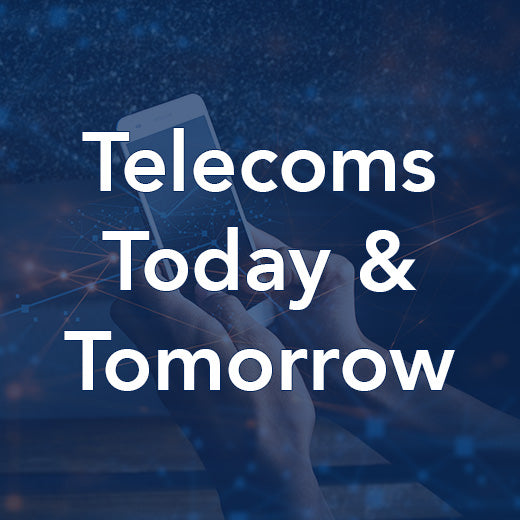
Telecoms - Today and Tomorrow
This intensive one-day workshop provides delegates with a clear understanding of the technologies available for use within communications networks. It considers how technologies have evolved and then considers fixed-line and mobile voice and data networks. The full range of broadband technologies is introduced both for fixed and mobile access. Join our Telecoms Today and Tomorrow workshop to gain a comprehensive understanding of the technologies driving communication networks. This one-day course covers the evolution of technologies, fixed-line and mobile voice and data networks, and a range of broadband technologies for both fixed and mobile access. Whether you're a senior executive, manager, regulator, market analyst, marketer, or new industry recruit, this workshop is designed to benefit anyone in the communications industry seeking insight into converged communications markets. No technical background is required to participate in this workshop, making it accessible to a wide range of professionals. Topics covered include the operation of PSTN, circuit switching vs. packet switching, Intelligent Network principles, Value Added Services, mobile networks, IP data networks, Quality of Service in data networks, Next Generation Networks, Voice over IP challenges, core network evolution, and more. By the end of the workshop, you'll have a solid understanding of transmission technologies, optical fibre techniques, satellite telecommunication networks, GPS, broadcast radio and TV networks, and other key concepts shaping the future of telecommunications. Don't miss this opportunity to enhance your knowledge and stay ahead in the rapidly evolving telecom industry. Enroll in our Telecoms Today and Tomorrow workshop today and gain valuable insights into the technologies shaping the future of communication networks. Who would benefit Those involved in the communications industry who require an understanding of the wide range of technologies used within a converged communications market such as: senior executives; managers; regulators; market analysts; marketeers and new recruits to the industry. Prerequisites This workshop is designed for those with no technical background. Topic Areas Include Basic operation of the Public Switched Telephone Network (PSTN) Comparison of circuit switching and packet switching techniques Principles of an Intelligent Network (IN) Opportunities provided by Value Added Services (VAS) Basic operation of mobile networks and features of an IP data network Quality of Service (QoS) in data networks Fixed broadband access technologies and mobile networks Principles of Next Generation Networks (NGN) Challenges of operating Voice over IP (VoIP) Evolution of fixed and mobile core networks The IP Multimedia Subsystem (IMS) Transmission technologies including PDH and SDH Developments in optical fibre techniques Operation of satellite telecommunication networks The Global Positioning System (GPS) Principles of broadcast radio and TV networks
£980.00
-
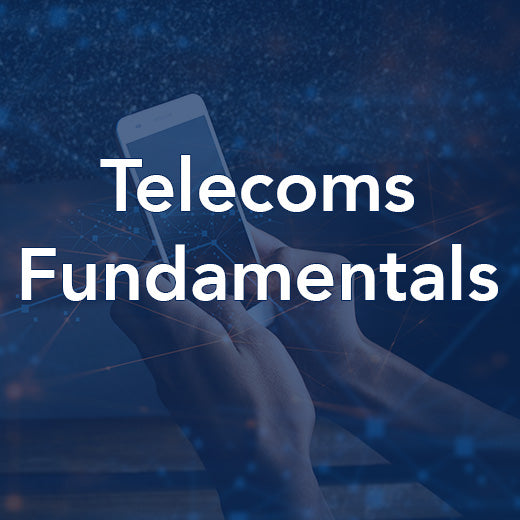
Telecoms Fundamentals
Course Code: WR1701 Course Summary This course has been designed for those who do not have a technical background and are new to the telecommunications industry or those who are currently working in the sector. The historical background to telecommunications is described and the technologies, abbreviations and techniques that are employed are explained. During the course, emphasis is placed on learning by group work, discussion and exercises that enhance the understanding of networks and their operation. Use of laptops, tablets and smartphones with Internet access are employed to explore emerging technologies in various areas. Videos and images of equipment and networks are used to explore the many applications of telecommunication in the modern world. Topic Areas Include Defining Telecoms and the Nature of Information A Historical Background to the Telecom Network Digital Fixed Telecom Networks Data Networks Mobile Networks and Wi-Fi Broadband and Emerging Networks
POA: Private Course
-
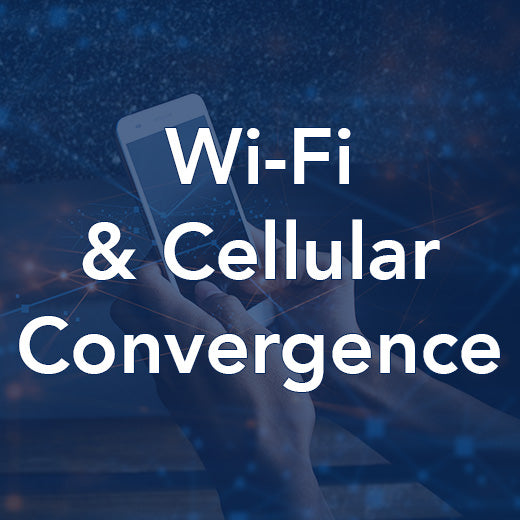
Wi-Fi and Cellular Convergence
Wi-Fi and cellular convergence is a crucial aspect of modern communication networks, allowing seamless integration between Wi-Fi and cellular technologies. This course, with the course code WR1401, provides a comprehensive overview of the 802.11 family of wireless LAN technologies, commonly known as Wi-Fi. Participants will gain insights into the different forms of Wi-Fi in use, as well as a detailed understanding of the structure, operation, and functionality of Wi-Fi connections. Moreover, the course delves into the integration of Wi-Fi access into cellular provider portfolios and explores techniques for interworking between different access environments. This training is ideal for communications professionals involved in Wi-Fi network design and administration, as well as those responsible for deploying and maintaining Wi-Fi systems. Participants should ideally have a basic understanding of cellular networks and a keen interest in learning about Wi-Fi technologies. By the end of the course, attendees will have a solid grasp of wireless LAN technologies and standards, the protocol stack layers, Wi-Fi security, deployment, and integration strategies. In just 1 day and 2 live online sessions from 0900 to 1230, participants can enhance their knowledge and skills in Wi-Fi and cellular convergence. Don't miss this opportunity to stay ahead in the ever-evolving world of wireless communication technologies. Course Summary This course presents an overview of the 802.11 family of wireless LAN technologies that are more commonly known as Wi-Fi. The course introduces the various forms of Wi-Fi currently in use and looks in detail at the structure, operation and functionality of Wi-Fi connections. It then examines issues related to the integration of Wi-Fi access into cellular provider’s portfolios and techniques that allow interworking between the access environments. Who would benefit This course is suitable for communications professionals involved in Wi-Fi network design and administration, and also those involved in deploying and maintaining Wi-Fi based systems. Prerequisites Delegates should ideally have an understanding of cellular networks and a keen interest in understanding Wi-Fi technologies. Topic Areas Include Wireless LAN Technologies and Standards The Protocol Stack Layer 1 The Protocol Stack Layer 2 Wi-Fi Security Wi-Fi Deployment and Integration
POA: Private Course
-
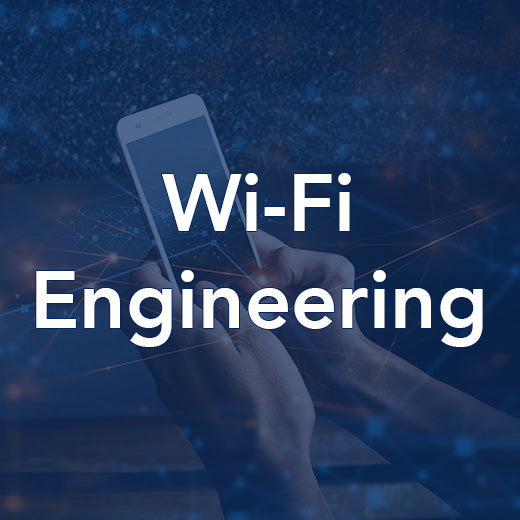
Wi-Fi Engineering Overview
This Wi-Fi Engineering Overview course provides a comprehensive understanding of the 802.11 family of wireless LAN technologies, commonly known as Wi-Fi. Participants will gain insights into the different forms of Wi-Fi networks currently in use, as well as a detailed examination of the structure, operation, and functionality of Wi-Fi connections. The course also covers essential security mechanisms to safeguard Wi-Fi networks and addresses common Wi-Fi problems and troubleshooting techniques. Ideal for communications professionals involved in Wi-Fi network design, administration, deployment, and maintenance, this course equips participants with the knowledge and skills needed to effectively manage Wi-Fi-based systems. While a background in telecommunications or Information Technology is beneficial, individuals with a keen interest in technology can also benefit from this course. Key topic areas covered in this course include Wireless LAN Technologies and Standards, 802.11 PHY, MAC Frame Structures, MAC Procedures, Security measures, and Wi-Fi Troubleshooting. By the end of the 2-day course comprising 4 live online sessions, participants will have a solid foundation in Wi-Fi engineering and be better equipped to handle the complexities of Wi-Fi networks. Course Summary This course presents an overview of the 802.11 family of wireless LAN technologies that are more commonly known as Wi-Fi. The course introduces the various forms of Wi-Fi currently in use and looks in detail at the structure, operation and functionality of Wi-Fi connections. It then examines the security mechanisms required to protect a Wi-Fi network. Consideration is also given to identifying common Wi-Fi problems and how to correct those issues in a Wi-Fi network. Who would benefit This course is suitable for communications professionals that will engaged in Wi-Fi network design and administration, and also those involved in deploying and maintaining Wi-Fi-based systems. Prerequisites Delegates should ideally have a background in telecommunications or Information Technology with an interest in technology. Topic Areas Include Wireless LAN Technologies and Standards 802.11 PHY MAC Frame Structures MAC Procedures Security Wi-Fi Troubleshooting
POA: Private Course
-

Wray Castle Hub (12 Month Subscription)
Annual Telecoms Training Subscription Package with Unlimited access to 500+ hours of key training material Empower your professional development by building your knowledge of key technology and business topics within the telecoms industry. Unlimited access to future new courses that will cover the latest technology developments as they are added to Hub throughout your 12-month subscription period. Endlessly flexible and applicable to any role within the telecoms industry a subscription to Wray Castle Hub is your ultimate learning resource. You can choose to follow one of our suggested learning pathways, build your own or dip into the learning material module by module. The Wray Castle Hub is also available as an 6-Month Subscription for £945. Learn more here.
£1,400.00
-

Wray Castle Hub (6 Month Subscription)
6-Month Telecoms Training Subscription Package with Unlimited access to 500+ hours of key training material Empower your professional development by building your knowledge of key technology and business topics within the telecoms industry. Unlimited access to future new courses that will cover the latest technology developments as they are added to Hub throughout your 12-month subscription period. Endlessly flexible and applicable to any role within the telecoms industry a subscription to Wray Castle Hub is your ultimate learning resource. You can choose to follow one of our suggested learning pathways, build your own or dip into the learning material module by module. The Wray Castle Hub is also available as an Annual Subscription for £1,400. Learn more here.
£945.00
-

Wray Castle Industry Primers Collection
The Wray Castle Industry Primer collection gives you unlimited access to our growing library of short, focused online training courses. Get upskilled on your chosen topics in just 3 hours with our collection of new short online primers. Our primers cover the key technology and business topics shaping the industry today and tomorrow. You'll benefit from videos, illustrated course books, dedicated tutor support, and regular assessments and earn digital badges to showcase your achievements. A subscription gives you access to all the existing primers below plus all future primers as and when they are published, so you'll always stay ahead of the latest developments across the industry.
£450.00
-

Wray Castle Learning Account
Upskill your workforce with flexible, scalable training solutions The Wray Castle Learning Account offers a flexible, scalable training solution for organizations, enabling upfront budgeting, tailored programs, and comprehensive reporting. Key Features Customised Programmes - Work directly with us to build training programmes tailored to your organization's needs, ensuring budget safety and scalable delivery. Wide Course Variety - Access live sessions, live virtual training, e-learning modules, private team workshops, and expert consultancy services. Upfront Planning - Allocate funds in advance, plan training strategically, align with organizational goals, and gain comprehensive reporting on spend and consumption. Programme Benefits Budget Control & Safety - Maintain complete oversight of training expenditure with upfront allocation. Strategic Alignment - Plan training initiatives with competency assessment options to meet organizational goals. Additional Resources - Access webinars, primers, and supplementary learning materials. Visibility & Reporting - Comprehensive tracking and reporting on training consumption and ROI. Broad Topic Coverage - Wide range of subject areas to address diverse training needs. Simplified Invoicing - VAT invoicing and payment via Purchase Order for streamlined procurement. The Wray Castle Learning Account is ideal for: Organizations seeking to centralize training and budgets. Teams with predictable training spend looking for simplified invoicing and reporting. Organizations requiring scalable training solutions for growing teams L&D and Training Managers who need to demonstrate clear ROI. Ready to transform your training contact us today?
POA: Private Course







































